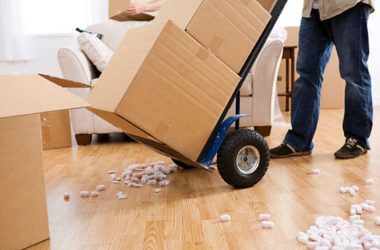A major move is an incredibly stressful endeavor. Whether you’re downsizing, moving into a new home closer to friends and loved ones, moving into a senior living community, or even moving in with a family member, you can find yourself struggling to handle the move. These moving tips for seniors can make the process much easier.
Step One: Take a Look at Your New Home
Before you move, it’s important to carefully evaluate your new home. You need to know:
- How much space you’ll have
- What the floor plan looks like
- What room you have for storage
- How closely you’ll share space with your neighbors
- Any modifications you will need to make for overall safety
Your new space may look substantially different from your current one. Many seniors need to downsize as they move into an assisted living facility or other new residence. If you’re moving from a full-size house to an apartment, you may need to reduce your furniture or arrange for storage. Knowing how much space you have available can make it easier to proceed with the moving process.
Step Two: Evaluate What Help You Will Need
For many seniors, moving is no longer nearly as simple as throwing all of their possessions into boxes and placing everything in the back of a moving truck. One of the most important moving tips for seniors is to be realistic about what you can accomplish on your own and when you will need assistance. Consider:
Do You Need Help Packing Boxes?
If bending down to place items in boxes or trying to move heavy boxes to the side of the room poses a significant physical challenge, you may want to arrange for help packing, unpacking, and shifting those boxes. Also, consider whether you have the skills to pack delicate objects, especially those that may be going into storage for a long time.
Can You Move Furniture on Your Own?
Most of our moving tips for seniors focus on planning and safety. You may need to move heavy furniture or pick up large boxes in order to manage your move on your own. If you struggle with those tasks, you may need to arrange for someone else to come in and help you.
Do You Feel Overwhelmed by the Thought of Packing up Your Home?
You have had years to accumulate a large range of possessions. For many seniors, packing and moving feels overwhelming. If you do not feel able to take on the task yourself, consider arranging for friends, family members, or professional movers to come in and help.
Pro Tip:
If you don’t have friends and relatives helping with your move, a full-service moving company can make it much easier for you to manage your move. Contact local moving companies to learn more about what services they offer and what moving tips for seniors they have.
What Do You Need in a Moving Company?
Many seniors find that working with a full-service moving company is an easier, more effective way to handle a major move. What do you need in a moving company? Carefully consider what services you need and evaluate whether the company you’re considering provides those services. If you want a moving company who will take care of your move from start to finish, the company needs to:
- Provide packing materials
- Pack up your possessions
- Handle disassembling furniture in your old home
- Move your possessions
- Store your possessions, if you have time between leaving your former home and moving into the new one
- Unload your possessions
- Reassemble furniture
- Unpack
- Carry out packing materials and other trash
Most moving companies will allow you to choose the specific services you need based on your capability and the time you have available. Evaluate the services you need and your budget as you consider how you want to handle your move.
Also, consult the National Association of Senior Move Managers to learn more about the available options for senior citizens planning a big move. Older adults may have specific needs, and senior movers have the tricks and moving tips for seniors that can help you achieve your goals.
As you’re considering a moving company, you may also want to ask questions about how they handle health care needs, including COVID-19 challenges. Do movers wear masks? Will they be allowed to move your possessions if they’re ill (or if they have come into contact with a sick individual)? Older adults, especially those with specific health care risks, may want to make sure the moving company takes appropriate precautions.
Step Four: Create a Moving Timeline
Whether you’re moving across town into an assisted living community or making a long-distance move to a new state, you need a timeline that will help you plan for your move and keep everything on track. Moving can be stressful. A timeline can help prevent you from missing out on any of the important items on your to-do list.
Work backward to create an effective timeline. When do you plan to move into your new residence? You may have a specific move-in date, often issued by nursing homes and assisted living facilities. Alternatively, you may have more general guidelines — a plan to be in your new home by a certain date, but the freedom to move your plans a few days in either direction, for example.
Pro Tip:
Your move timeline will be based on how long you have to complete your move. If you’ve received little warning that a bed has come open in your preferred nursing home or that an assisted living community has an opening that you have to take advantage of immediately, you may need to move faster.
Moving Tips for Seniors Two Months Before the Move
At least two months before your move, start preparing. Create an organization system. Will you use virtual moving checklists on your phone or computer, or do you want a hard copy list? What paperwork will you need for the move? Start a file on all that important paperwork. You will need to:
- Start thinking about downsizing, if necessary. What possessions do you plan to take with you? What possessions do you no longer want to keep?
- Plan a yard sale, if needed. Set a date and plan to have everything ready to go by that time.
- Collect your medical records, especially if you have a medical condition that needs to be monitored.
- Research professional movers, if you haven’t already. Keep in mind that you may need to get on their schedule early.
- Buy supplies for your move.
- Set a moving budget. Moving can be expensive, and you need to know what funds you will have on hand.
What Supplies Do You Really Need For Your Big Move?
As you prepare for your move, make sure you have the right supplies on hand. You will need:
- Boxes in multiple sizes
- Packing materials, including packing peanuts, bubble wrap, or other padding for delicate items
- Permanent markers for labeling boxes
- A utility knife or scissors to help make opening and unpacking easier
- Small plastic bags for screws and smaller items
Your moving company may provide many of these supplies, especially if you opt for a full-service move. Consult your moving company to learn what supplies they have available and what you will need to purchase or prepare on your own.
Moving Tips for Seniors One Month Before the Move
As your move draws closer, you need to start making critical decisions and packing up your possessions. You may need to:
- Decide how you’re going to handle storing or rehoming possessions that you don’t want to take with you when you move.
- Hold your yard sale.
- Make sure you have movers scheduled, if needed.
- Arrange for friends and family members to come help on the day of the move.
- Notify utility companies, your landlord, and anyone else who needs to know that you’re planning to move out.
- Schedule move-out inspections.
- Start packing non-essential possessions, especially things you plan to place in storage or things you know you will not need before your move.
- Book travel arrangements, if needed.
- Make arrangements to cancel memberships and services you no longer need. This might include a membership to a local gym or senior center that you will no longer be able to access after your move.
Moving Tips for Seniors Three Weeks Before the Move
With three weeks left before moving day, you need to:
- Make arrangements for moving your pets. Your moving company does not take care of this task. This is especially important if you’re planning a long-distance move and cannot transport your pets on your own.
- Decide how you want to handle moving plants. You may not want to leave your plants, especially delicate ones, in the hands of the movers. Make arrangements for a friend or family member to move them if needed, or plan to drive them yourself.
- Make arrangements to change your address with any regular deliveries or services that you use.
- Notify banks, credit cards, insurance companies, and other providers about the coming address change. Officially file your change of address forms on the USPS website, and handle all your other change of address to-dos.
- Make plans for how you will handle the rest of your food. If you’re just moving across town, you may be able to move some of your food supplies. If you’re moving cross-country, on the other hand, you may want to plan to empty your freezer and fridge as much as possible ahead of time. Keep in mind that anything you have left over, you have to manage!
- Arrange to transfer your home insurance, if needed.
- Confirm dates to turn on utilities at your new home, if needed.
- Keep packing.
Moving Tips for Seniors Two Weeks Before the Move
You’re settling into crunch time, and you want to be sure that everything is ready to move into your new home. This week, you’ll need to:
- Pack up any particularly valuable items and arrange for how you want to handle them. This could include heirlooms or items to which you attach special memories. You may not want movers to handle some of your most valuable possessions, so make sure you know what you want to do with them!
- Dispose of any dangerous items, like paint, industrial cleaners, or hazardous materials that you cannot move with you.
- Create a plan for cleaning your home before you move out. If you have challenges like mold, make sure you have a plan for addressing them.
- If you’re planning a long-distance move by car, get your car serviced this week so you know it will carry you safely to your destination.
- Keep packing. Arrange for loved ones to come help you pack, if possible. If you’re having movers pack up for you, you may still want to pack up any items that require special care or that have significant sentimental value.
- Create a plan for your “essentials” boxes and bags.
Pro Tip:
If you need to arrange for a final cleaning before moving out, consider bringing in a cleaning service. It will help relieve stress since you won’t have to worry about handling the cleaning yourself. It will also ensure a deeper clean than many people can get on their own, increasing the odds that you’ll get your deposit back.
Moving Tips for Seniors One Week Before the Move
Your move is getting closer. You may feel your stress mounting as your move gets ever closer. Make sure to take time to sit back and relax if you need it. Don’t be afraid to ask for help, especially as you wrap up the entire process.
- Confirm all the details. Make sure you confirm your dates with your moving company. If you’re moving into an assisted living facility or nursing home, check your move-in dates a final time.
- Finish packing.
- Clean out the cabinets and dispose of unneeded food in the freezer or fridge. Consider donating it or giving it to friends and family members.
- Make any final plans for the big day.
- Prepare your “essentials box” with items that you will need on your big day.
- Arrange to move any items that won’t be going to your new home to storage.
What Items Need to Go in Your Essentials Box or Bags for Moving Day?
There are some items that you will need immediately when you arrive at your new home. You will want to include:
- Enough clothes for a few days. Make sure to include clothes that you can get dirty. Unpacking can be a messy business.
- Cleaning supplies, especially if you suspect you will need to deep clean your new home before you can move in
- Toiletries
- Toilet paper
- Paper towels
- Coffee maker and coffee
- Pet food and dishes, if needed
- Bedding
- An emergency kit
- A shower curtain, if needed
- A towel (or towels, if you’re moving with your spouse)
- Tools
- Important records and paperwork
- Your medications
- A phone charger
- Any other items you know you will need immediately or in the first couple of days after your move
Pro Tip:
Consider buying an extra container of your most important toiletries so you can pack them in your essentials box ahead of time.
The Day of Your Move: Final Moving Tips for Seniors
If you’ve followed all the preparation steps carefully, you’ll be ready by the time moving day arrives. Inevitably, surprises will crop up on the day of your move — but you’re prepared to handle them. On moving day, you should:
- Take a last look through the house to make sure you haven’t missed anything. Check for last-minute items you may have used the night before, including toiletries.
- Meet your movers or the people helping with your move. Coordinate as needed.
- Turn in your keys or any important paperwork.
- Move to your new home!
- Make sure that the movers take care of any necessary tasks, including reassembling furniture if that’s part of your contract. Double-check important items before they leave.
After the Move
Unfortunately, your job isn’t done when you finish packing up your old home. Fortunately, however, the hardest part is now over. After you complete your move, make sure that you:
- Unpack.
- Arrange for a new driver’s license if you’ve moved to a new state.
- Register your car in your new location.
- Make plans to meet friends and neighbors. If you’ve moved into an assisted living facility or nursing home, check out the schedule and learn what events you have available!
Step Five: Prepare to Downsize
One key advantage of following these moving tips for seniors and getting started early is you can take your time at every stage of the move. Start by taking a look at your possessions. If you’re moving to a smaller home, including a nursing home or assisted living facility, you will need to find a way to reduce the number of possessions you will take with you on moving day.
For seniors moving into a smaller environment, you have several options for downsizing. Consider these moving tips for seniors who want to declutter and downsize:
- Sell specific items that have value but that you no longer want or need.
- Donate items as needed. You may want to donate to a local shelter or find a secondhand store.
- Hold a yard sale.
- Give items to friends and family members.
- Throw away items that you no longer want and that you cannot sell or give away.
- Store items you will use periodically but which won’t fit in your new home. Choose a suitable storage unit or other storage space. This might, for example, include holiday decorations.
As you prepare to downsize, set aside a box or bag for each purpose. You may want to pack many of your possessions as you go to make it easier to get through each room.
Pro Tip:
Search for storage near you to learn what options you have available and what it will cost to store your possessions. This can make it easier for you to decide what will fit your budget and help you streamline what you want to keep.
Step Six: Start Packing
Packing is the most stressful part of moving for most individuals. If you’re worried about what it will take to pack up your home and manage your possessions, remember, you do not have to do it alone. You can enlist help from caregivers, friends and family members, or professional movers. These packing and moving tips for seniors can also make the packing process easier.
- Start in an area of the house that you don’t use regularly. If you need to pack up a shed, garage, or workshop, those areas may be the easiest place to start. Don’t forget storage areas like the attic or basement. Save your primary living space for last.
- Sort as you pack. Keep in mind that you will need to unpack and deal with anything you pack up now in your new environment. If you are relocating into a much smaller environment, be aggressive about sorting out items you will not need.
- Label boxes, furniture, and other possessions clearly. Consider using colored stickers to label items intended for different rooms.
- Make the moving process slow and steady. Some senior citizens struggle with the cognitive tasks necessary to make a big move. Others have significant mobility-related challenges. By taking your move slow and steady, you may find that it’s easier to handle the challenges associated with your move.
Remember to follow the schedule we outlined above so you have plenty of time to pack without feeling overwhelmed.
Step Seven: Unpack
Packing is the biggest part of the moving process and the part that can cause the most stress. Unpacking, however, brings with it its own challenges. As you plan to unpack, consider these factors:
- If you’re moving out of your own home into a shared environment, work with your new roommate to share space effectively.
- Unpack the kitchen first. It’s one of the most-used rooms in your home and will help you feel more at home in your new environment.
- Take it a step at a time. Just like packing to move out, unpacking can be a process. Give yourself enough time to take care of all of the tasks on your list.
- Arrange for help if you need it. You may need to direct friends and loved ones in where things go or simply trust that they can handle many of those tasks, like filling bookshelves or placing items in your linen closet.
Making a move as an older adult can bring with it considerable stress and other challenges. With a solid plan in place and these moving tips for seniors in mind, however, you can reduce your stress and make the move easier to manage.
Additional Moving Resources
Moving and packing guides
- How to Move a Couch
- How to Move a Mattress
- How to Move a Refrigerator
- How to Move a Piano
- How to Move a Pool Table
- How to Pack Shoes for Moving
- How to Pack Dishes and Glasses









